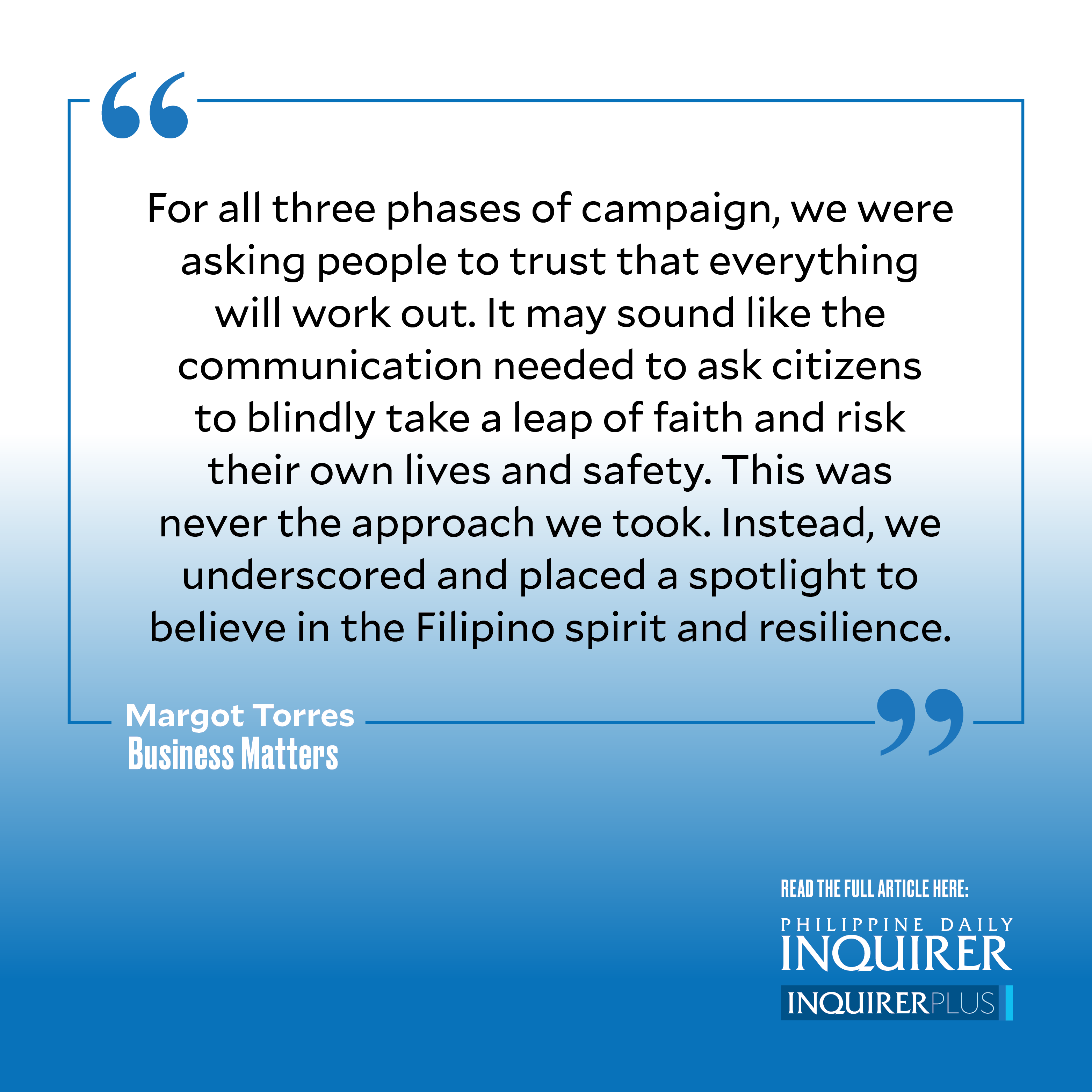The power of hope (2)

Last week’s piece highlighted the crucial role of communication in empowering Filipinos amid the COVID-19 crisis. The advertising industry created campaigns to transform the public mindset—from encouraging people to leave their homes in a bid to reopen the economy in 2020, and with the guidance of the Philippine Medical Association and the Philippine Society for Microbiology and Infectious Diseases, asking Filipinos to trust COVID vaccines in 2021, and by 2022, teaching people to live with COVID and continue their lives safely.
The changing situation was a key consideration in planning the execution of these massive communication campaigns. These are the four key lessons learned from navigating the pandemic:
Lesson 1: The need for contextual messaging. What we needed to apply was a strategy called contextual messaging. The message must be meaningful and relevant for it to resonate; it must be right at a given point in time. For vaccination, context was equally important as it related to available supply and the goal at that point in time—to jab a particular sector or region, to jab the remaining unvaccinated, to jab kids, or to implement boosters. It depended largely on whether demand outstripped supply.
There were three phases:
First, when supply and demand were low, we focused messages on reasons why we should consider getting vaccinated—for ourselves, families, friends, and loved ones, and for the future.
Second, when supply and demand increased and when jab rates became critical, we focused the message on the arrival of vaccines as a symbol of hope, on the increasing number of Filipinos getting vaccinated, and on the safety and efficacy of the COVID vaccine. On ground activations through vaccine events were done involving influencers to help convince citizens about the benefits of vaccination; vaccine incentives were also offered through Bakuna Benefits.
Third, when demand outstripped supply, we continued to reassure the unvaccinated about the safety and effectivity of vaccines by showing that millions of Filipinos have been fully vaccinated. More grassroots communication was implemented by region, by sector (seniors), by age (kids), and by industry (for tourism, industrial zones).
Lesson 2: The need for one message. It was never about multiple brands. Each company willingly set aside their differences, removed their individual brand hats, and committed to one message. This was evident in private sector collaboration across all three campaigns. This was reinforced later as we worked hand in hand with government. Having one message ensured it resonated across different channels and through different messengers. One unified message made it louder and more impactful to compete against a clutter of messages.
Lesson 3: The need to stay attuned to consumer sentiment. Given the uncertainty of the situation and the changing sentiment, knowing the current state of mind of the consumer was critical through research and social listening, as well as feedback from local government units on what’s happening on the ground.
Lesson 4: The need to constantly change mindsets. Any piece of communication has an objective or task to fulfill. The challenge for communications for the past two years has been about changing mindsets:
Phase 1 – “Ingat Angat Tayong Lahat” to increase consumer confidence and safely reopen economy and transform the mindset FROM staying home to keep safe TO going out safely with a mask, distancing, and handwashing (prevaccination period) to help reopen the economy.
Phase 2 – “Ingat Angat Bakuna Lahat” to increase vaccine willingness by changing mindsets FROM being uncertain or unwilling TO understanding the need for the added protection of vaccination. The campaign contributed to this objective, with vaccine hesitancy dropping to 8 percent in December 2021 from 33 percent in May 2021 (Social Weather Stations).
Phase 3 – “Tuloy ang Ingat, Tuloy ang Angat” to coexist with COVID and move on with our lives by changing mindsets FROM COVID as a pandemic crisis TO COVID as endemic and which can be managed with caution and proper care and discipline. The most important guidelines for people were vaccination, appropriate ventilation, wearing a mask, and isolating when sick. The messaging shifted to “Tuloy ang Ingat, Tuloy ang Angat,” with campaign break last March 2022.
For all three phases of campaign, we were asking people to trust that everything will work out. It may sound like the communication needed to ask citizens to blindly take a leap of faith and risk their own lives and safety. This was never the approach we took. Instead, we underscored and placed a spotlight to believe in the Filipino spirit and resilience. It was a calling to do our part dutifully, to listen to the medical experts and authorities as well as practice self-discipline, together. It was a message to never lose hope and embrace optimism and the essence of being Filipino.
——————
Margot Torres is managing director of McDonald’s Philippines and head of communications for Task Force T3.
——————
Business Matters is a project of the Makati Business Club (makatibusinessclub@mbc.com.ph).




















